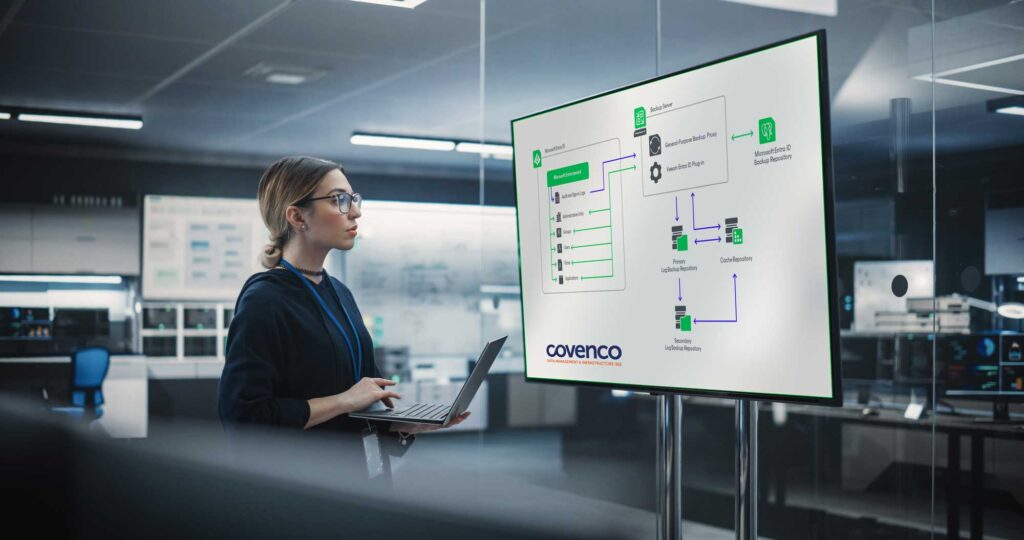IN-DEPTH ARTICLE: 10 MINUTE READ
Immutable Off-Site Backup Solutions
The latest generation of AI-enabled ransomware attacks pose an existential threat to businesses of all sizes throughout the UK. A robust and verifiable backup strategy is no longer a mere contingency plan – it is a foundational pillar of corporate resilience. IT leaders already know the question is not if your organisation will face a cyber event, but when, and whether your recovery capabilities are genuinely fit for purpose.
The market has responded with Immutable Cloud Backup Solutions, a non-negotiable requirement that guarantees your recovery points cannot be altered, encrypted, or deleted by an attacker, or indeed, by an errant insider. This principle, often enforced through technologies such as Write Once Read Many (WORM) storage or object-lock policies, ensures that at least one copy of your critical data remains pristine and available for a clean recovery.
Choosing a trusted partner who offers genuine, well-architected immutability – and crucially, the associated rapid recovery services – requires careful evaluation.

VENDOR-AGNOSTIC BACKUP AND RECOVERY
Selecting a Vendor-Agnostic Approach to Backup & DR
A successful relationship between a business and its backup provider must be built on technical competence, but underpinned by a strategic alignment that puts the customer’s existing technology and team experience first. This is where the vendor-agnostic approach becomes an essential, non-negotiable requirement.
A truly vendor-agnostic service provider does not attempt to shoehorn your organisation into a proprietary, ‘one-size-fits-all’ solution that only works with their specific hardware or cloud platform. Instead, they operate as a strategic consultant, assessing your current IT ecosystem – your data volumes, existing backup software, network architecture, and crucially, the in-house skill set of your technical teams.
This approach offers distinct and vital advantages to a mature IT function:
- Optimisation, Not Replacement: A vendor-agnostic partner will seek to leverage your existing investments. If your team is highly proficient in a certain backup platform, the service provider should integrate their off-site immutable storage seamlessly with that platform. This maximises your return on investment in software licenses and training, avoids the immense disruption and risk of a ‘rip and replace’ project, and allows your team to continue using the tools they know best.
- Reduced Vendor Lock-in: The great risk of proprietary platforms is the resulting vendor lock-in, which restricts your ability to negotiate pricing, change service parameters, or migrate in the future. A provider who can support multiple platforms gives your organisation leverage, ensuring your backup strategy remains adaptable to future changes in technology or business needs without prohibitive migration costs.
- A Tailored Operating Model: The service should blend to match your operational model. If you prefer to manage the backup policies and schedules yourself, the provider’s service should offer the secure, immutable repository as a highly reliable utility. If you require a fully managed, hands-off service, the provider must have the expertise to assume full operational responsibility across your chosen technology stack. The resulting solution is not just a service; it is a bespoke extension of your own infrastructure and team.
In short, a service provider’s value is enhanced exponentially when they can blend their technical provision to match the technical reality and operational experience of the customer’s own team and infrastructure. This consultative, non-prescriptive stance is the hallmark of a partner, not merely a vendor.
TECHNICAL DEPTH
The Technical Depth: Vendor Specialism and Platform Competence
While strategic flexibility demands a vendor-agnostic mindset, technical delivery necessitates deep vendor specialism. This is not a contradiction; it is a critical dual mandate. A good service provider must possess significant, demonstrable partnerships and competencies across the leading and emerging data protection and storage platforms.
For a UK-based service provider to offer genuinely best-in-class advice, they must have more than a cursory understanding of the major industry players. This includes, but is not limited to, platforms such as:
- Veeam: Recognised for its versatility across virtual, physical, and cloud environments.
- Rubrik and Cohesity: Leaders in modern, scale-out, and zero-trust data security architectures.
- Commvault: A long-standing enterprise platform for complex and heterogeneous environments.
- Scality, IBM Storage Guardium, and Object First: Innovative storage solutions that provide the underlying, highly resilient, and often purpose-built immutable repositories for on-premises solutions.
The service provider’s technical teams must hold the highest levels of certification and partnership with these technology vendors. This expertise allows them to:
- Design the Optimal Immutable Solution: They can impartially advise on which platform – or combination of platforms – will deliver the required Recovery Point Objectives (RPO) and Immortality Retention Policy at the most effective price point, while integrating seamlessly into the client’s existing architecture.
- Guarantee True Immutability: Simply offering ‘immutable storage’ is insufficient. True cyber resilience requires expertise in the specific immutability features of each platform, whether it is S3 Object Lock, a hardened Linux repository, or a proprietary file system. The provider must be expert in configuring these features to be completely tamper-proof, even from internal administrative errors or compromised credentials.
- Accelerate Deployment and Troubleshooting: Deep specialism ensures that integration projects are deployed rapidly and correctly the first time. Moreover, in the critical event of a recovery scenario, the provider’s certified specialists can troubleshoot complex technical issues faster than a generalist, cutting minutes and hours off your downtime.
The combination of a vendor-agnostic approach with specialist platform competence ensures your organisation receives both unbiased advice and highly expert execution.
OPERATIONAL AGILITY
Operational Agility: Flexibility in Policy and Account Management
In an era where compliance rules, data volumes, and cyber threat profiles change constantly, rigidity in a service model is a critical weakness. Therefore, the third key requirement is for the provider to demonstrate a flexible approach to backup policies and account management.
A service provider should not impose a rigid, predefined set of backup rules on your organisation. Flexibility should manifest in several areas:
- Granular Policy Customisation: Businesses have different classes of data – mission-critical databases, non-critical user files, and long-term archive data – all of which require distinct RPOs, retention periods, and geographical storage requirements. The provider must enable you to define these policies with granular control, allowing for:
-
- High-Frequency Backups for the most critical applications, with near-zero RPO.
- Shorter Retention for less critical, transient data.
- Legal Hold and Compliance-Driven Retention for specific data sets that must be kept for years.
- Scalable and Transparent Pricing Models: As data volumes inevitably grow, the service should scale effortlessly and the pricing structure should be clear and predictable, avoiding the punitive and opaque egress or API request charges often associated with hyperscale public clouds. Flexible models allow a business to optimise costs by aligning payment with actual usage and value.
- Dynamic Account Management and Governance: Your business and IT strategy will evolve, and the service provider must be able to adapt with you.
This includes: -
- Self-Service Portals: Enabling your IT team to manage and monitor jobs, initiate test restores, and run audit reports on-demand.
- Access Control: Implementing strict Role-Based Access Control (RBAC) and Separation of Duties to prevent a single point of administrative compromise. A flexible provider will tailor these governance tools to match your internal security policies.
- Contractual Adaptability: The best partners understand that data volumes are unpredictable. They offer contractual mechanisms that allow for temporary spikes in consumption or planned long-term shifts in your data retention strategy.
This operational agility ensures the immutable backup service remains a business enabler, not a bureaucratic constraint.
RETENTION STRATEGIES
Comprehensive Retention Strategy: Multi-Tiered and Air-Gapped Solutions
Immutability ensures the integrity of your backup, but a complete strategy requires a thoughtful approach to retention across multiple tiers of storage media. The provider must be able to deliver a multi-layered retention strategy to meet both immediate operational needs and long-term regulatory compliance.
A truly resilient retention framework follows the ‘3-2-1-1-0’ rule, with a specific focus on the ‘one copy being air-gapped or immutable’. The key tiers of service a provider must offer are:
- Short-Term / Critical Data Retention (Rapid Access): This tier holds your most recent, mission-critical recovery points. The provider must store this data in a rapidly accessible medium – typically high-speed object storage or disk – to guarantee the lowest possible Recovery Time Objective (RTO) for daily operational restores. The data here is immutable, but the speed of access is paramount.
- Long-Term / Archive Retention (Compliance and Air-Gap): For data that must be kept for years to meet stringent UK and international compliance regulations (e.g., GDPR, financial regulations), a completely isolated storage solution is essential. A leading provider will offer air-gapped long-term storage, with tape backup often being the ultimate, gold-standard medium for this purpose:
-
- Physical Air-Gap Security: Tape backups, when physically removed from the drive library and stored in a secure, off-site vault, provide a literal, physical air-gap. They are completely disconnected from the network, making them immune to any form of network-borne attack, including zero-day ransomware.
- Cost-Effective Archive: Tape remains the most cost-effective solution for massive volumes of cold, long-term archive data, avoiding the escalating costs of keeping petabytes on high-speed disk or hot cloud storage.
The ability to seamlessly tier data from rapid-access immutable disk to air-gapped, offline tape within a unified service is a strong indicator of a provider’s maturity and commitment to comprehensive resilience.
RECOVERY OPTIONS
The Moment of Truth: Demonstrable and Fast Recovery Options
The fifth and most crucial requirement is Recovery. Any backup service, regardless of its immutability or technical elegance, is only as good as the speed and reliability of the recovery process. IT leaders must scrutinise the provider’s ability to demonstrate multiple, fast recovery options, understanding that the Priority Recovery Objective (PRO) and the Total Recovery Objective (TRO) must be considered together.
- PRO vs. TRO: The PRO is the RTO for your most critical systems, those services that must be restored first to stop the bleeding. The TRO is the time required to recover the entire IT estate back to a clean, pre-infection state. A provider must have services that address both.
- Testable and Verified Recovery: The provider must enforce and facilitate regular, automated testing and verification of all restore points – the ‘zero errors’ component of the 3-2-1-1-0 rule. If you cannot prove your clean, immutable copy is recoverable, it is useless.
- Multiple Restoration Vectors: The best providers offer a menu of recovery options to suit the specific disaster scenario:
- Cloud Recovery: Instantaneous recovery of virtual machines into the provider’s own secure, clean cloud environment for immediate operational continuity.
- Granular Restoration: Fast, self-service recovery of individual files or objects back to the customer’s live environment.
- Physical Recovery from Cyber Infection: In the event of a catastrophic and widespread network infection that has compromised all on-site infrastructure, the traditional restore-over-the-network method is risky and slow. This is where truly innovative services shine.
Solutions such as Covenco’s Ship-to-Site Hardware Recovery provide a unique and clean way to recover from a network-wide infection:
-
-
- The provider loads the clean, immutable backup images onto pre-configured, clean hardware in their secure facility.
- This hardware – acting as the new core infrastructure – is then physically shipped and deployed on the customer’s site or a secure temporary location.
- This isolates the recovery process from the contaminated customer network, providing a fast, isolated, and verified clean foundation from which the business can rapidly resume operations, bypassing the arduous and dangerous task of cleaning up a compromised local infrastructure first.
-
The ability to offer this ‘clean room’ physical recovery option demonstrates a provider who has truly planned for the worst-case scenario, offering a robust safety net that significantly reduces both the RTO and the TRO for the most devastating cyber incidents.
BEYOND TECHNOLOGY
Beyond Technology: The Service-Based Differentiators in Backup Resilience
For IT leadership, the technical requirements – immutability, RTO, RPO – are essential, but the true measure of a world-class provider lies in the quality of the managed service wrapped around that technology. The strategic partner handles the complexity and labour, allowing your internal team to focus on core business innovation.
Seamless Migration: The White-Glove Backup Handover
The process of transitioning from an existing, perhaps failing, backup solution to a new, immutable service is often a major blocker. A superior provider offers a white-glove, fully managed migration solution.
The goal of this service is total continuity – the customer should never worry about losing historical backup data during the transition. The provider’s team should take complete ownership of the migration project, ensuring that every historic restore point is safely transferred, verified, and integrated into the new platform’s immutable repository. This complete management removes operational risk and resource drain from the customer’s IT team, guaranteeing that the new immutable service is fully operational and verified before the old platform is decommissioned.
Continuous Monitoring and Management: Eliminating Errors and Failures
A backup job that finishes without error is only the start. True service quality is defined by full backup monitoring and management, where dedicated resources proactively look out for subtle errors, anomalies, and failures that could compromise a recovery.
The best providers operate a dedicated Managed Services Team for this purpose. They implement continuous surveillance of backup quality and effectiveness, monitoring metrics far beyond a simple pass/fail status, such as:
- Anomaly detection that could signal a nascent cyber-attack.
- Backup performance bottlenecks and integrity checks.
- Verification that immutability policies are correctly applied to every restore point.
This commitment to visibility should extend directly to the customer. Providers like Covenco offer to share their backup monitoring and reporting directly with their customers in real-time. This ensures the customer always has continuous, transparent visibility of their backups, transforming the process from a periodic audit into a shared, operational certainty.
Proactive Recovery Assurance: Testing and Orchestration
The final, critical differentiator is the provider’s commitment to ensuring that recovery works, not just in theory, but in practice. This goes beyond simple self-testing of a backup file. A good provider provides regular backup and recovery testing, including scenario testing and role-play, conducted side-by-side with the customer’s disaster recovery plans.
This is a deep dive into genuine preparedness, encompassing:
- Comprehensive Recovery Planning: The provider helps to formalise or refine the customer’s own Recovery Plan, defining the exact steps, system dependencies, and personnel roles required for a full-scale recovery.
- Recovery Orchestration: This involves scheduling and scripting the recovery process to ensure that dependent systems are brought online in the correct sequence – a critical factor in complex enterprise environments.
- Scheduled Testing and Role-Play: Regular, scheduled recovery testing (often on a quarterly or bi-annual basis) that involves the customer’s team. This scenario testing can simulate a specific event, such as a ransomware attack or a site-wide failure, to identify any gaps in the plan, the technology, or the human process. This practical, real-world exercise ensures the customer’s recovery capability is robust and that all teams are familiar with the process under pressure.
CONCLUSION
Cloud Backup Service Providers: A Strategic Choice for IT Resilience
For UK IT managers and senior executives, the choice of an Immutable Off-Site Backup provider is a strategic decision that directly influences the longevity and resilience of the business. The price point is secondary to the quality of the service architecture.
The discerning decision-maker must look beyond marketing claims of ‘immutability’ and demand a partner who meets this comprehensive six-point mandate: a vendor-agnostic strategic approach, backed by deep specialism in key vendor platforms, delivered with operational flexibility, offering multi-tiered and air-gapped retention, demonstrating innovative and verifiable fast recovery options, and providing the critical managed services for migration, monitoring, and testing.
In the face of the relentless cyber threat, a provider who embodies these qualities is not just selling a service; they are delivering the ultimate insurance policy for business continuity and regulatory adherence, ensuring that when the inevitable occurs, your organisation has a clear, clean, and rapid path back to operation.
For more information about Covenco’s range of Immutable Cloud and On-Premises Backup and Recovery services, call Gurdip Sohal, Director of Data Management Services at Covenco: 01753 732000 or complete the call-back form below.

Request a Call-Back
Please complete this form to request a call back from our Immutable Cloud Backup & Recovery Specialists.
We typically respond within one working day.



